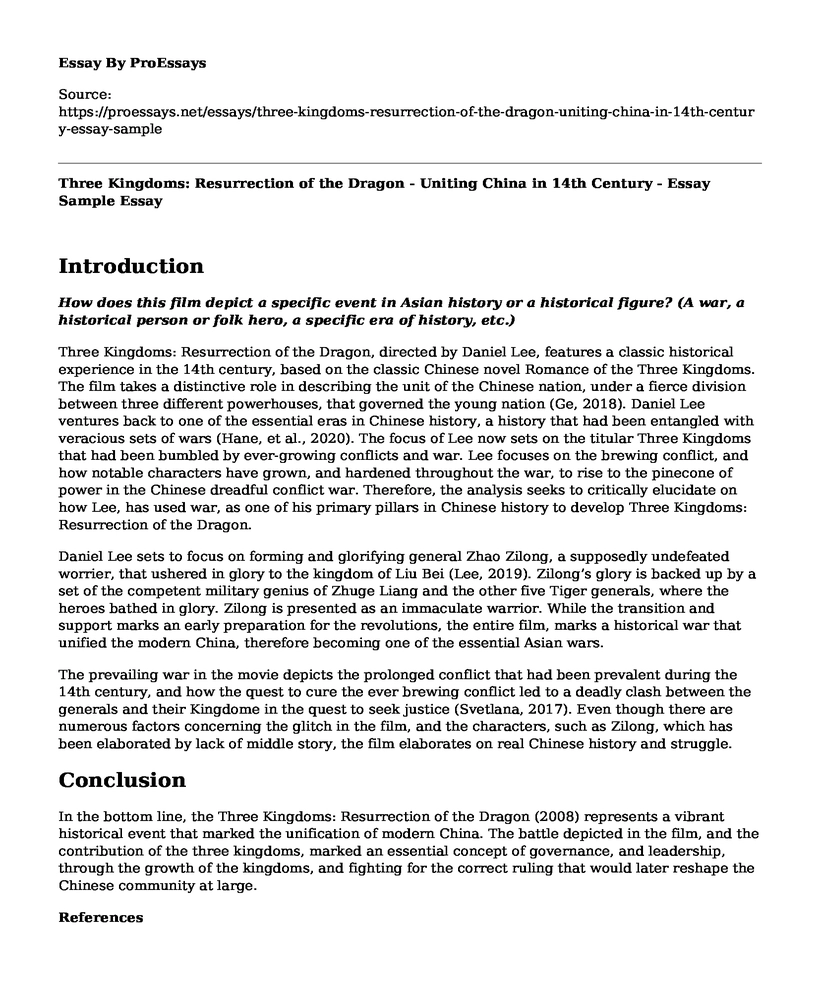Introduction
How does this film depict a specific event in Asian history or a historical figure? (A war, a historical person or folk hero, a specific era of history, etc.)
Three Kingdoms: Resurrection of the Dragon, directed by Daniel Lee, features a classic historical experience in the 14th century, based on the classic Chinese novel Romance of the Three Kingdoms. The film takes a distinctive role in describing the unit of the Chinese nation, under a fierce division between three different powerhouses, that governed the young nation (Ge, 2018). Daniel Lee ventures back to one of the essential eras in Chinese history, a history that had been entangled with veracious sets of wars (Hane, et al., 2020). The focus of Lee now sets on the titular Three Kingdoms that had been bumbled by ever-growing conflicts and war. Lee focuses on the brewing conflict, and how notable characters have grown, and hardened throughout the war, to rise to the pinecone of power in the Chinese dreadful conflict war. Therefore, the analysis seeks to critically elucidate on how Lee, has used war, as one of his primary pillars in Chinese history to develop Three Kingdoms: Resurrection of the Dragon.
Daniel Lee sets to focus on forming and glorifying general Zhao Zilong, a supposedly undefeated worrier, that ushered in glory to the kingdom of Liu Bei (Lee, 2019). Zilong’s glory is backed up by a set of the competent military genius of Zhuge Liang and the other five Tiger generals, where the heroes bathed in glory. Zilong is presented as an immaculate warrior. While the transition and support marks an early preparation for the revolutions, the entire film, marks a historical war that unified the modern China, therefore becoming one of the essential Asian wars.
The prevailing war in the movie depicts the prolonged conflict that had been prevalent during the 14th century, and how the quest to cure the ever brewing conflict led to a deadly clash between the generals and their Kingdome in the quest to seek justice (Svetlana, 2017). Even though there are numerous factors concerning the glitch in the film, and the characters, such as Zilong, which has been elaborated by lack of middle story, the film elaborates on real Chinese history and struggle.
Conclusion
In the bottom line, the Three Kingdoms: Resurrection of the Dragon (2008) represents a vibrant historical event that marked the unification of modern China. The battle depicted in the film, and the contribution of the three kingdoms, marked an essential concept of governance, and leadership, through the growth of the kingdoms, and fighting for the correct ruling that would later reshape the Chinese community at large.
References
Ge, L. (2018). A Study of Two Classics: A Cultural Critique of The Romance of the Three Kingdoms and The Water Margin. Chinese Literature, Essays, Articles, Reviews, 40, 259-262.
Hane, lP., He, J., Fu, J., Reid, S., & Niosi, J. E. (2020). A Romance of the Three Kingdoms: Biotechnology Clusters in Beijing, Shanghai, and Guangdong Province, China. In Disruptive Technology: Concepts, Methodologies, Tools, and Applications (pp. 1241-1289). IGI Global.
Lee, S. (2019). The South Korean film industry and the Chinese film market. Screen, 60(2), 332-341.doi.org/10.1093/screen\
Svetlana, B. (2017). Themes of «The Three Kingdoms» in Chinese cinema.11701/11779/2/reviewSV_Otzyv_o_rabote_Belovoj.pdf
Cite this page
Three Kingdoms: Resurrection of the Dragon - Uniting China in 14th Century - Essay Sample. (2023, Aug 22). Retrieved from https://proessays.net/essays/three-kingdoms-resurrection-of-the-dragon-uniting-china-in-14th-century-essay-sample
If you are the original author of this essay and no longer wish to have it published on the ProEssays website, please click below to request its removal:
- Poverty, Money, and Politics in the United States
- Classical Music Questions and Answers Paper Example
- Film Analysis Essay on Creed: Knockout Storytelling of Never Giving Up
- Facebook Vs Twitter Survey
- Zone of Proximal Development: Benefits for Teaching - Essay Sample
- Essay Example on Exploring Racism & Culture: A Movie About American Diversity
- Essay Sample on How I Met Your Mother: A 21st Century Sitcom Sensation







